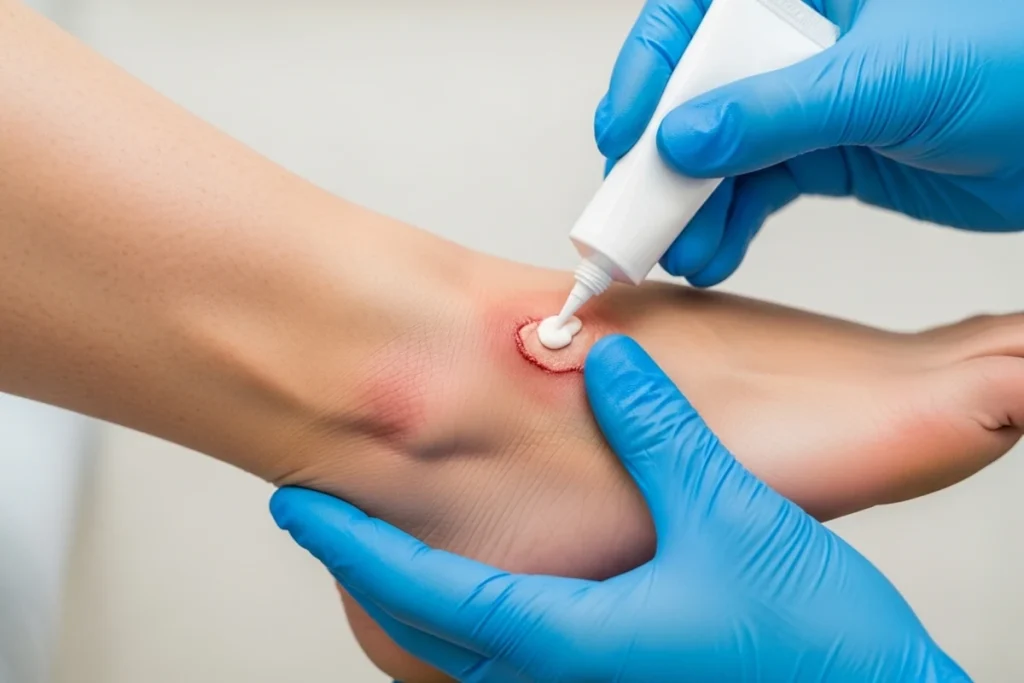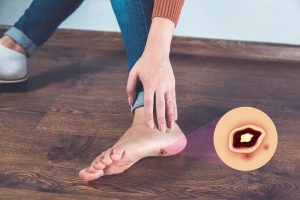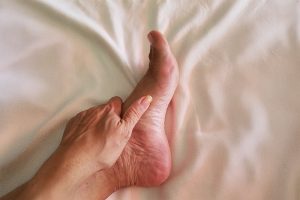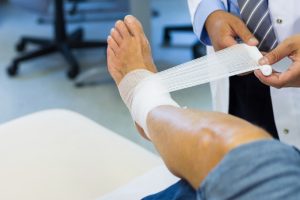Diabetes can affect blood flow and nerve health, which makes even small cuts or blisters risky if not treated quickly. A tiny cut, blister, or sore can become big trouble if it’s not cared for early. At Foot & Ankle Specialty Centers, we provide trusted diabetic foot care in Gilbert for people who want to protect their feet and prevent serious complications. Our podiatrists understand how diabetes changes the feet and offer complete care to keep them healthy.
Signs of Diabetic Feet
You need diabetic foot care in Gilbert if you experience:
- Tingling or numb feeling in your feet
- Swelling or redness that doesn’t go away
- Cuts or blisters that heal slowly
- Color changes on the skin
- Dry or flaky skin
- Pain or warmth in one spot

Common Diabetic Foot Problems
Here are the problems, per the best podiatrists in Gilbert, AZ:
Foot ulcers | Calluses |
Infections | Dry, cracked skin |
Peripheral neuropathy | Loss of sensation |
Charcot foot / deformity | Poor circulation |
Ingrown toenails | Foot sores that won’t heal |
Causes of Diabetic Feet
- High blood sugar damaging nerves over time
- Poor circulation slowing healing
- Weak immune system making infections easier
- Foot deformities causing pressure spots
- Dry skin cracking open
- Small injuries that go unnoticed

Diabetes Foot Care and Treatments in Gilbert
Our advanced foot and ankle specialists offer diabetic foot care in Gilbert that focuses on finding problems early and treating them before they get worse:
Treatment Type | What It Involves |
Regular Checkups | Doctors check blood flow, skin health, and nerve feeling to find problems early. |
Wound Care | Cleaning and treating open cuts or sores to stop infection and help healing. |
Custom Shoes or Insoles | Special footwear to reduce pressure on sensitive areas and prevent ulcers. |
Nail and Skin Care | Trimming thick nails, removing calluses, and treating cracked or dry skin. |
Circulation Treatments | Improving blood flow with medical care when circulation is poor. |
Nerve Pain Management | Using medicine and gentle care to reduce burning, tingling, or pain. |
Patient Education | Teaching how to wash, dry, and inspect feet daily to avoid new problems. |
How to Prevent Diabetic Feet?
The best way to prevent foot problems is to stay consistent with diabetic foot care in Phoenix. Keep your blood sugar in a healthy range, inspect your feet daily, and clean them with warm water and mild soap. Dry carefully, especially between toes. Always wear shoes that fit well and never go barefoot. Trim nails straight across, and check for small cuts, redness, or swelling. See a podiatrist if anything looks different or painful.
Diabetic Foot Care Near Me in Gilbert
Our experienced podiatrists at Foot & Ankle Specialty Centers are ready to offer advanced diabetic foot care in Gilbert. We offer modern treatments, preventive care, and guidance designed specifically for people living with diabetes.
Don’t wait until pain or infection begins, and book an appointment today and protect your feet with expert care from our Gilbert team.
FAQs
Does Medicare cover routine foot care for diabetics?
Yes. Medicare may help pay for foot care when diabetes causes nerve or circulation problems. Routine trimming or cleaning may not be covered unless there’s a medical need.
How often should a diabetic visit a podiatrist?
A yearly visit is usually enough for people with no major issues. If you are experiencing nerve damage or poor circulation, go every few months.
How does having diabetes affect your feet?
Diabetes can damage nerves and blood vessels. That makes feet numb and slower to heal.
Related Blogs

What is the Best Dressing for Diabetic Foot Ulcers?
Living with a diabetic foot ulcer is hard. It hurts, it drains, and it just doesn’t heal like a regular wound. One of the most important

How Can Diabetics Improve Circulation in Feet?
Diabetes makes your feet feel colder, tingle, or go numb. Poor circulation is often the reason. When blood flow slows, your feet don’t get enough oxygen

What is Foot Wound Care for Diabetics?
Diabetic foot wounds need special care unless it leads to poor blood flow and nerve damage. These factors make it harder for wounds to heal properly.
